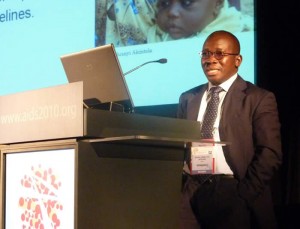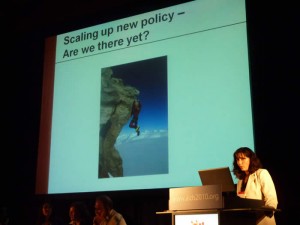The Infant & Young Child Nutrition (IYCN) Project joined the Elizabeth Glaser Pediatric AIDS Foundation (EGPAF), PATH, the World Health Organization (WHO), and mothers2mothers for a satellite session on Thursday, July 22, at the XVIII International AIDS Conference in Vienna, Austria. More than 100 delegates joined presenters and moderator Dr. Laura Guay of EGPAF to discuss the WHO recommendations on infant feeding and HIV released in November 2009. Presentations included:
Update on the 2009 WHO Guidance on Infant Feeding and HIV
Dr. Nigel Rollins of WHO introduced the new guidelines, emphasizing that the overall aim is to improve HIV-free survival. He reviewed the recent research on extending antiretroviral prophylaxis through six months of breastfeeding that informed the guidelines, including the Kesho Bora, Mma Bana, and BAN studies. Dr. Rollins also announced the release of the new full-length guidelines, which expand on the November 2009 Rapid Advice issues. He said, “The recommendations and benefits are a major opportunity to improve [maternal and child health].”
Download the new full-length guidelines.
Download the PowerPoint presentation.
New Tools to Support National Policy Change and Implementation
Emily Bobrow of EGPAF shared her organization’s new resources available to help countries adopt and implement the guidelines, including a toolkit designed for national-level and technical working groups. She discussed current operations research in Côte d’Ivoire, Lesotho, and Rwanda to evaluate the impact of the new recommendations.
Download the PowerPoint presentation.
National Interpretations: How Nigeria and Other Countries are Responding to the New Guidelines
The IYCN Project’s Wasiu Afolabi presented lessons learned from Nigeria’s experience reaching a national consensus on the WHO guidelines. He encouraged national prevention of mother-to-child transmission of HIV and nutrition stakeholders in other countries to work together early in the adoption process to interpret the WHO recommendations within their country context and to achieve a broad consensus.
Read a Q&A with Wasiu Afolabi to learn more about the WHO guidelines in Nigeria.
Download the PowerPoint presentation.
Providing Supportive Supervision to Guide Effective Implementation of Changing Policies
To help guide appropriate implementation of the new guidelines, PATH’s Dr. Kiersten Israel-Ballard shared a framework for a multipronged approach to providing supportive supervision for the implementation of the new WHO recommendations. Dr. Israel-Ballard stressed the importance of all parts being included, and shared best practices, including multisectoral government approaches, engaging working groups, and developing strategic plans and monitoring and evaluation frameworks.
Download the PowerPoint presentation.
Supporting Infant Feeding Practices in Swaziland: Challenges and Best Practices in the Field
Nontobek Mbuyane Dlamini from mothers2mothers presented challenges and good practices for implementing the new guidelines at the community level. She discussed infant feeding challenges in Swaziland, such as stigma and poor messaging, and explored partner involvement and health talks as solutions that show great promise.
Download the PowerPoint presentation.
Dr. Guay concluded the session by leading a question and answer session. Dr. Rollins clarified the recommendation on exclusive breastfeeding for six months followed by an additional six months of breastfeeding for HIV-affected children. He said the message is the same for all mothers, with HIV-unaffected children continuing to breastfeed to 24 months of age.
Dr. Rollins shared that WHO has met with the ministries of health in the top 20 HIV-affected countries to engage stakeholders and rapidly implement the new recommendations, and that WHO is continuing the dialogue with countries as they implement the guidelines.
When asked about new approaches for implementing the WHO recommendations, Mr. Afolabi stressed the importance of mobilizing the entire community. He said community approaches like engaging men and grandmothers in infant and young child nutrition will be crucial to its success.
Date: Jul 22, 2010 | Category: Events


